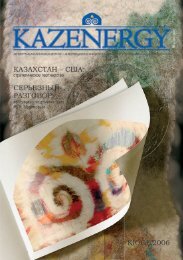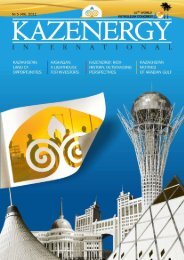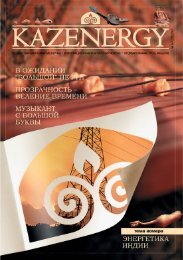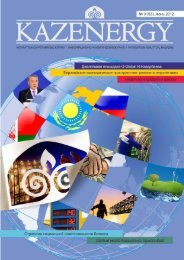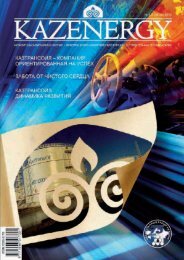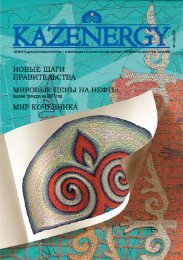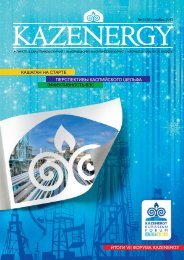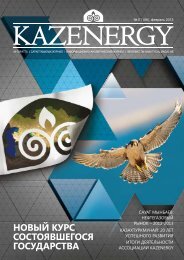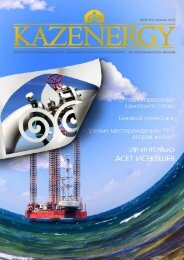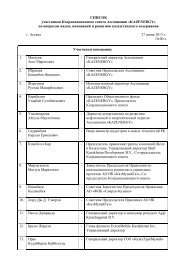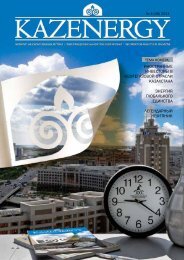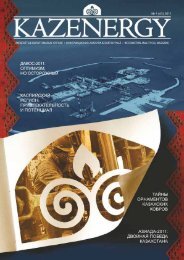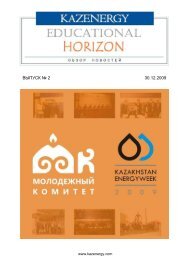KAZAKHSTAN UPSTREAM OIL AND GAS technology and R&d ...
KAZAKHSTAN UPSTREAM OIL AND GAS technology and R&d ...
KAZAKHSTAN UPSTREAM OIL AND GAS technology and R&d ...
Create successful ePaper yourself
Turn your PDF publications into a flip-book with our unique Google optimized e-Paper software.
R&D focus<br />
108<br />
A need for more communication<br />
<strong>and</strong> better planning on a national<br />
scale<br />
By comparing the industry-prioritized R&D<br />
focus areas (from the latest topic mapping<br />
exercise reported earlier plus input gathered<br />
throughout the project) with the strengths of<br />
the Kazakhstan R&D community (information<br />
gained during visits to leading laboratories<br />
<strong>and</strong> institutes), it has been possible to<br />
identify the R&D focus areas most likely to<br />
bear immediate fruit. Four areas st<strong>and</strong> out:<br />
correlation of NMR core data from SCAL<br />
studies with well logs; the use of non-metallic<br />
materials in highly corrosive environments;<br />
sulphur storage <strong>and</strong> applications; <strong>and</strong><br />
bio- <strong>and</strong> nano-sensors for environmental<br />
monitoring.<br />
It would be reasonable to expect R&D<br />
proposals from the Kazakhstan academic<br />
community to centre around these areas<br />
<strong>and</strong>, in time, to see Kazakhstan develop<br />
strong capabilities in the NMR interpretation<br />
of complex rocks, in the use of non-metallic<br />
pipelines <strong>and</strong> in the utilisation of sulphur (sour<br />
gas to power was seen as a particularly<br />
interesting opportunity in this area).<br />
Kazakhstan is already well recognized for its<br />
environmental services <strong>and</strong>, with more R&D,<br />
should realistically aim to become an industry<br />
leader in this area.<br />
The process of identifying R&D priorities<br />
that was begun during the roadmapping<br />
project is one that must be carried out on a<br />
continuous basis <strong>and</strong> become more focused<br />
<strong>and</strong> directed. There is a strong case for the<br />
establishment of a council at government<br />
level, including representatives from industry<br />
<strong>and</strong> the academic community, tasked with<br />
national R&D strategy development <strong>and</strong><br />
planning in Kazakhstan.<br />
R&D in Kazakhstan suffers severely from a<br />
lack of communication <strong>and</strong> collaboration,<br />
especially between the parties seeking<br />
solutions <strong>and</strong> those able to generate them:<br />
one of the more striking features to emerge<br />
from the roadmapping project is the relatively<br />
poor communication between the upstream<br />
oil operators <strong>and</strong> the Kazakhstan academic<br />
community. An organization with authority is<br />
needed to control <strong>and</strong> coordinate upstream<br />
oil <strong>and</strong> gas R&D in Kazakhstan, to provide<br />
focus, to determine funding <strong>and</strong> monitor the<br />
outcomes of the work.<br />
R&D planning<br />
It would be realistic to expect the Kazakhstan<br />
government/industry R&D planning process<br />
to be founded on the established principles<br />
used to plan <strong>and</strong> manage R&D by many large<br />
<strong>technology</strong>-oriented companies. Translated<br />
onto a national scale, the process might be<br />
run along the following lines:<br />
n The major operators <strong>and</strong> service companies<br />
would each outline their views on the prime<br />
challenges faced by their organisations<br />
on an annual basis – they would be<br />
encouraged to provide information on<br />
the nature <strong>and</strong> status of the challenge, its<br />
urgency <strong>and</strong> the size of the prize.<br />
n The information, once analysed <strong>and</strong><br />
consolidated, would be made widely<br />
available to the academic community <strong>and</strong><br />
used to shape R&D proposals.<br />
n Good proposals would be likely to feature<br />
international <strong>and</strong> in-country academic<br />
partnerships; they would also contain<br />
well-developed project cost estimates <strong>and</strong><br />
timeframes, <strong>and</strong> go as far as describing<br />
<strong>technology</strong> demonstration <strong>and</strong> field trials<br />
requirements.<br />
n Proposals received positively would be<br />
progressed in the first place by (1) a<br />
sharing of relevant data <strong>and</strong> information<br />
from the industry side with the R&D<br />
proposer <strong>and</strong> (2) the setting of suitable<br />
milestones <strong>and</strong> key performance indicators.<br />
n Assuming good progress of the work,<br />
it would be incumbent on the industry<br />
organisation that set the challenge to<br />
facilitate field trials of the new <strong>technology</strong><br />
solution.<br />
n The reasons behind unsuccessful proposals<br />
would be made clear <strong>and</strong> used to drive<br />
improvements in the sections of the<br />
academic community involved.<br />
The process just outlined addresses a<br />
number of the issues judged by participants<br />
in the roadmapping project to be hindering<br />
R&D in Kazakhstan – lack of focus, limited<br />
collaboration, poor underst<strong>and</strong>ing by the<br />
academic community of the challenges <strong>and</strong><br />
the opportunities within the industry, <strong>and</strong> the<br />
difficulty of fixing up field trials were foremost<br />
among them.<br />
Additional enablers highlighted during the<br />
course of the roadmapping project include<br />
the provision of guidance to academics on<br />
the commercialization of R&D; the relaxation<br />
of local content regulations in selected<br />
emerging <strong>technology</strong> areas; measures to ease<br />
the import of equipment for R&D purposes<br />
<strong>and</strong> field trials; <strong>and</strong> a facilitation of visits,<br />
perhaps extended stays, by international<br />
<strong>technology</strong> experts. The establishment of<br />
centres of excellence <strong>and</strong> <strong>technology</strong> parks<br />
was another measure favoured by many in<br />
the industry. Finally, there was a call for better<br />
underst<strong>and</strong>ing of international patent law <strong>and</strong><br />
clearer recognition of intellectual property<br />
rights.<br />
Kazakhstan Upstream oil & gas <strong>technology</strong> <strong>and</strong> R&D roadmap




